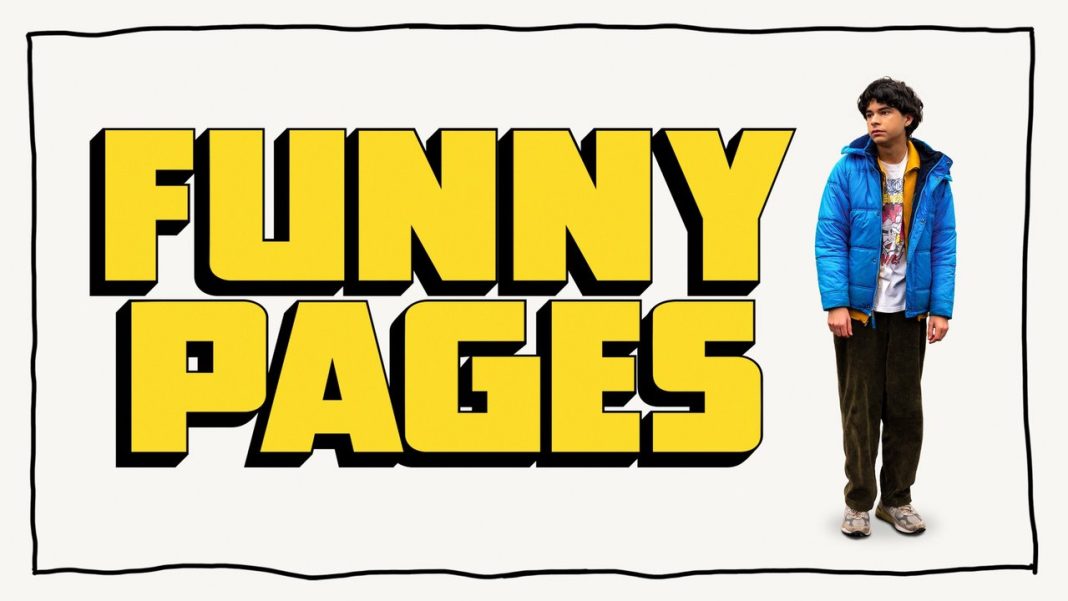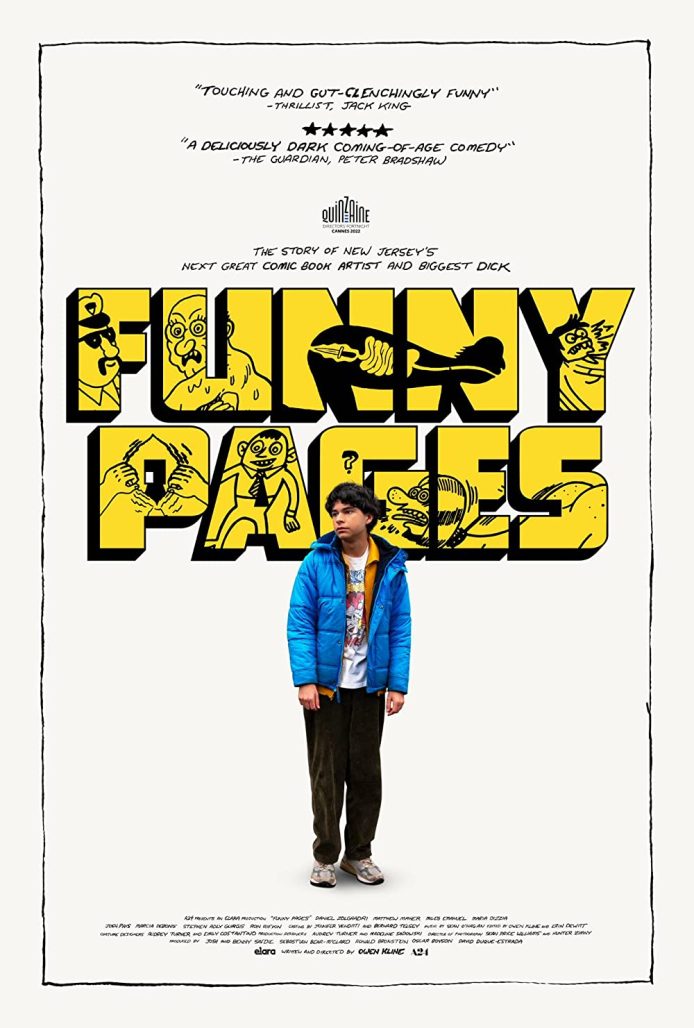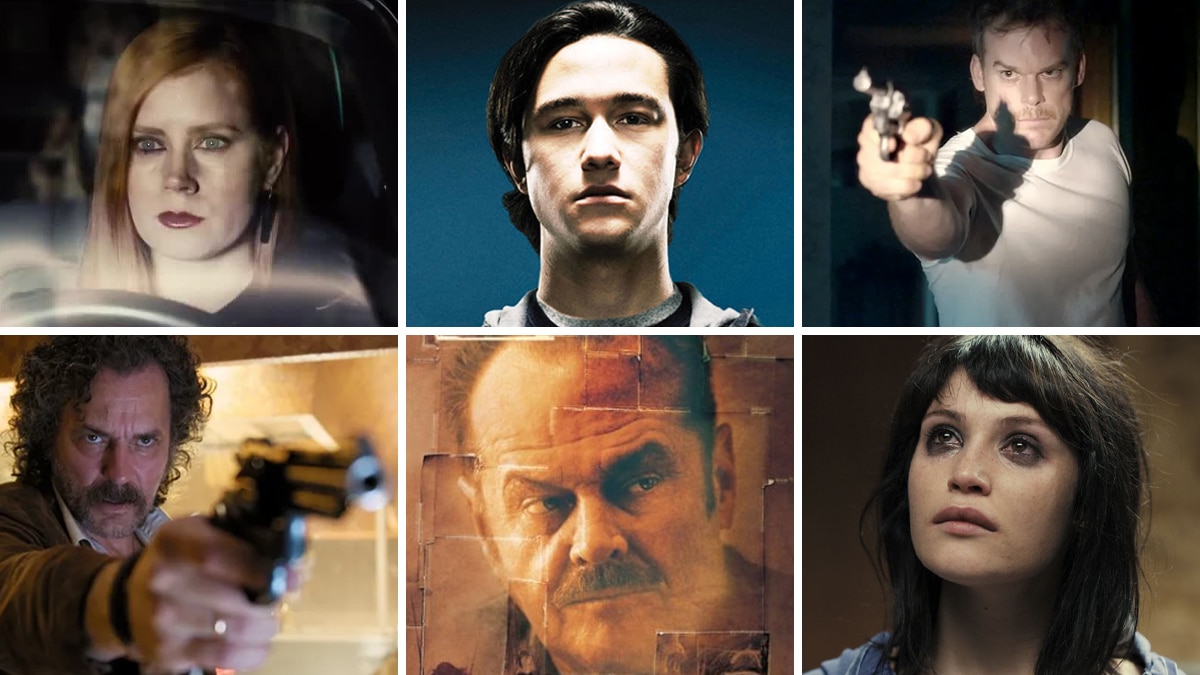Last month, I met up with some fellow NYC-based comic creator friends to see Funny Pages, a dark coming-of-age comedy – well, ostensibly a comedy – about an 18-year-old struggling cartoonist. It’s the debut feature by Owen Kline (son of actors Kevin Kline and Phoebe Cates), who wrote, directed, and edited the film with flashes of promise for the future of this young (if, it must be said, privileged) filmmaker. And hey, I’m a sucker for non-comics stories about the comics industry.
So it’s with sincere disappointment when I say that I… kind of hated this movie. And it’s not just because its absurdly bleak depiction of a young, ambitious comics creator sometimes hits too close to home for comfort (hell, it’s even set in my home state of New Jersey). It’s mostly that Funny Pages is so aggressively cynical in its attempts to portray the harsh realities of the comic book industry that it loops right back around to being implausible.
I’ll need to get into spoiler territory to properly contextualize why Funny Pages fails both as a movie and as an honest depiction of comic book fandom, so stop reading after this paragraph if you’d rather come back after seeing the film yourself. I don’t recommend it, but apparently I’m in the minority; Funny Pages currently has an 81% approval rating from critics according to Rotten Tomatoes, and everyone at my screening other than my comic book pals seemed to have a great time. If you want context for what I’m talking about but want to ensure you don’t have the miserable experience I had, though, some Wikipedia editors did a fine job summarizing Funny Pages in the “Plot” section.
Whether you saw the film or simply read the synopsis, the fact that Funny Pages is co-produced by Josh and Benny Safdie is unlikely to surprise you. Like The Safdie Brothers’ hit 2019 crime thriller Uncut Gems, Funny Pages is a deeply stressful viewing experience, and I don’t imagine I’d feel much differently even if I wasn’t myself as invested in the world of comics as its protagonist. Both films revel in their quirky cast of characters, and end in shocking violence.
But Uncut Gems, a film I adore, revolves around the sordid world of sports betting, and while its politics are nuanced and its characters are complex, it earns its intensity by ultimately being a morality tale about jeweler/gambler Howard (Adam Sandler) being punished for his hubris and greed. Funny Pages, on the other hand, also has a cast of deeply flawed characters, but without an intelligible narrative point to their suffering, the film’s ultimate tragedy is infuriatingly nihilist.
Funny Pages is hardly the only piece of fiction notable for its lack of likable characters (Miles, with his achingly gentle personality, is the only character we’re not meant to despise, and for that he’s stabbed in the head). HBO’s darkly humorous Succession thrives on the depravity of its obscenely wealthy, hilariously out-of-touch central cast, but it earns its sneering attitude towards its characters with a coherent thematic aim. I don’t love to hate the characters in Funny Pages the way I do the cast of Succession. More than anything, I pity them.
That, ultimately, is the most frustrating thing about Funny Pages: its utter disdain for its own characters. The crux of most of its punchlines is “look at these fucking weirdos,” which is not inherently a bad approach for a comedy, but the incessant mean-spiritedness becomes grating. A few characters, especially Wallace, are coded as having mental illnesses or personality disorders, and combined with the fact that many of them are clearly poor, the punching-down is too much of a bummer to be funny.
Worse yet is the frequency by which Funny Pages makes people’s physical appearance the butt of the jokes. I’ve seen a number of reviews praising the film for how “real” it’s cast looks, as most of them are not conventionally attractive, but that hardly seems praiseworthy to me when such choices appear to have been made just so we can laugh at their expense. Even when characters aren’t explicitly insulting each other’s looks, Funny Pages has such a grimy, sweaty aesthetic that it almost feels intentionally designed to highlight each character’s worst features. Even the lighting is unflattering.
Funny Pages‘ mean streak fluctuates slightly throughout its interminable 86-minute runtime, but the ending is almost cruel. The shocking violence of Miles getting stabbed in the head, followed by Wallace brutally beating Robert, reads like a metaphor for the punishment aspiring creators take to achieve even a modicum of success in the comic book industry, and I’ll be the first to grant that Kline has a point in depicting it so harshly.
Nor will I deny Klein the haunting symbolism of the film’s final shot: after watching his friend nearly get killed (Robert never goes back to check in on Miles after the stabbing, and since the film is told almost entirely from his perspective, it’s unclear if Miles even survives), Robert stumbles back to his local comic book shop. In what almost certainly was inspired by the final moments of Call Me By Your Name, credits roll on a single, uninterrupted shot of Robert’s bruised and bloodied face, staring listlessly in the distance.
I don’t want to assume intent, but the message appears quite clear: comics will never love us as much as we love them, but no matter how humiliated, demoralized, and tortured we are in service of a life in comics, we always find ourselves crawling back to comics, like the pathetic deadbeats that we are.
I don’t believe that stories necessarily owe us answers, hope, or happy endings. There is a place for angry stories, and perhaps even stories with contempt for their own audiences. But I do believe that such raw storytelling should be in service of a greater truth. There is emotional truth to the nastiness of Funny Pages, I’ll give it that. But it’s a petulant, immature sort of anger directed at no one in particular. There’s a lot of truth, but very little wisdom.
I’m sure Klein would hate me for this comparison (I suspect he shares Robert’s vocal distaste for cape comics), but in that sense, Funny Pages reminds me a lot of another comic book-inspired movie that made leave the theater feeling insulted and angry: Joker. Both films mistake cynicism for honesty, and edginess for profundity. Both films attempt to make broad, if true statements about the human condition (“the way people with mental illnesses are treated is bad!” / “the life of an artist is miserable and unforgiving!”) but are revealed to have far less to say than they think when any critical scrutiny is applied.
What Funny Pages fails to capture — and what might not even be possible to portray in any medium but comics — is the joy of comics. I’m talking about the joy we get from reading comics, of finding a community of like-minded comic book readers and/or creators, and of having even one person enjoy a comic that you’ve made, not for money or fame (a cosmically small percentage of comic creators get rich or famous anyway), but because we love comics and making them ourselves brings us joy.
Owen Kline clearly knows a lot about comics, but I don’t get the impression from Funny Pages that he likes comics very much. I’m sure that he used to, but I suspect he’s been burned very badly by comics, even though it’s hard to feel bad for a guy with rich and famous parents who managed to get the Safdie brothers to produce his debut feature while only in his early 30s. Either way, even if I didn’t enjoy Funny Pages, I respect Kline for sharing his bleak vision of comics with the world… and I hope he still finds joy in comics.









So, it seems that the logo is designed by Johnny Ryan. Seems rather appropriate, I guess…
Comments are closed.